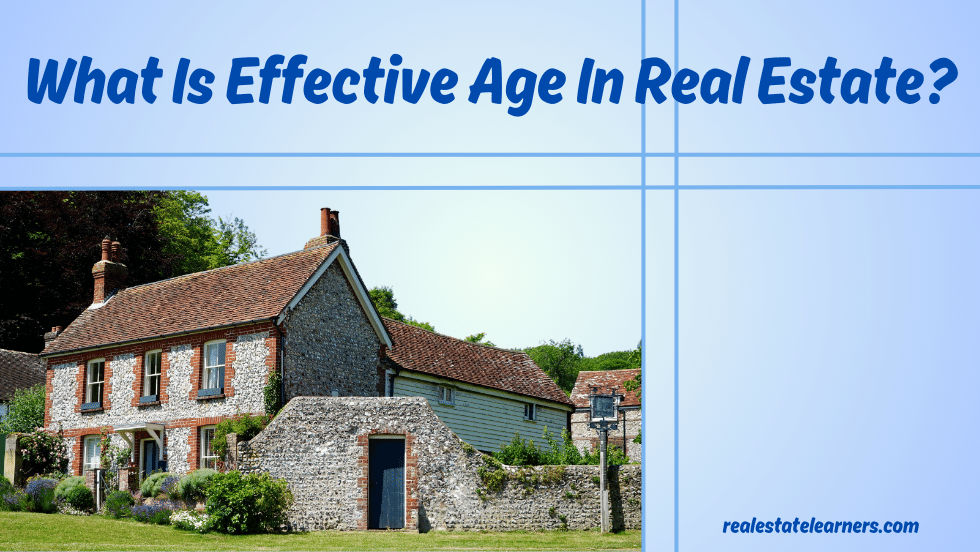When it comes to buying or selling a property, one of the key factors that comes into play is the concept of effective age. Real estate experts and professionals use this term extensively, but what does it really mean? This guide is going to delve into the details of effective age in real estate, and how it can affect the value and perception of a property.
What is Effective Age in real estate?
Effective Age is a term commonly used in real estate to describe the perceived age of a property. Unlike the actual age, which is determined by the year in which it was built, effective age takes into account the overall condition and maintenance of a property.
In simple terms, effective age can be defined as the estimated remaining lifespan of a property based on its current state. It is a subjective term that can vary depending on the perspective of different individuals, but it plays a crucial role in determining the value of a property.
Effective age on appraisal reports is often represented as a range of years, such as 10-15 years. This means that the property is considered to have an effective age somewhere between 10 and 15 years.
What is the Example of Effective Age in Real Estate?
Example 1: A property built in the 1950s may have an actual age of 70 years, but due to consistent maintenance and upgrades over the years, it may have an effective age of only 40 years. This means that the property is perceived to be in good condition with a lot of lifespan left, resulting in a higher value compared to a similar property with a higher effective age.
Example 2: Another example could be a newly constructed property that has been poorly maintained and neglected. Despite its actual age being only a few years, it may have an effective age of much higher due to the wear and tear it has already experienced. This will result in a lower value for the property as potential buyers will factor in the additional costs of repairs and upgrades.
Effective Age vs. Actual Age- What’s the Difference?
As mentioned earlier, actual age refers to the number of years since a property was built. On the other hand, effective age takes into account factors such as wear and tear, maintenance, and upgrades to determine how old a property is perceived to be.
In most cases, effective age can be less or more than the actual age depending on these factors. A well-maintained property may have a lower effective age compared to its actual age, while a neglected property may have a higher effective age.
Factors Affecting Effective Age
There are various factors that contribute to the effective age of a property. These include:
- Maintenance and Upkeep
One of the most critical factors affecting effective age is the maintenance and upkeep of a property. A well-maintained property that shows little signs of wear and tear will have a lower effective age compared to a poorly maintained one.
Regular maintenance not only keeps the property in good condition but also helps to prolong its lifespan, thus reducing its effective age.
- Quality of Construction
The quality of construction also plays a significant role in determining the effective age of a property. A well-built property using durable materials is likely to have a longer lifespan and therefore, a lower effective age.
On the other hand, properties that were constructed using low-quality materials or poor craftsmanship may appear older than their actual age and have a higher effective age.
- Renovations and Upgrades
Renovations or upgrades made to a property can also affect its effective age. For instance, if a property undergoes significant renovations, such as the replacement of old plumbing or electrical systems, it may have a lower effective age compared to similar properties that have not undergone any upgrades.
However, minor cosmetic changes like new paint or flooring may not significantly impact the effective age of a property.
- Location
The location of a property can also play a role in its effective age. Properties located in areas with harsh weather conditions or high levels of pollution may experience more wear and tear, resulting in a higher effective age.
On the other hand, properties situated in well-maintained neighborhoods or areas with favorable climate conditions may have a lower effective age.
Importance of Effective Age in Real Estate?
Affects Property Value
The effective age of a property can significantly impact its value in the real estate market. Properties with a lower effective age are often seen as more desirable and tend to have a higher market value compared to those with a higher effective age.
Buyers are willing to pay more for properties that are perceived to be newer and well-maintained, making effective age an essential factor in determining the price of a property.
Influences Insurance and Maintenance Costs
Effective age also plays a role in insurance and maintenance costs for a property. Older properties with a higher effective age are more likely to cost more in terms of insurance premiums, as they may be perceived to have a higher risk of damage or potential problems.
Similarly, maintaining an older property with a higher effective age may also require more frequent and expensive repairs, leading to higher maintenance costs.
Helps in Property Appraisals
When determining the value of a property for appraisal purposes, the effective age is taken into consideration. Appraisers will assess the overall condition of a property and consider its effective age when comparing it to similar properties in the area.
This helps to ensure a fair and accurate appraisal of the property.
Guides Investment Decisions
Effective age can also guide investment decisions in real estate. Properties with a lower effective age may be seen as better long-term investments, as they are likely to require less maintenance and have a longer lifespan. On the other hand, properties with a higher effective age may not be as attractive to investors, as they may require more frequent and costly repairs.
Conclusion
What does effective year built mean? Effective age is a crucial factor in the real estate market. It takes into account various aspects such as physical depreciation, functional obsolescence, and external factors to determine the actual condition of a property. By understanding effective age, buyers can make informed decisions when purchasing a property and sellers can accurately price their properties.

Corey has over 15 years of experience as a real estate broker and educator. He is dedicated to providing valuable insights and guidance for those looking to enter the real estate industry.

